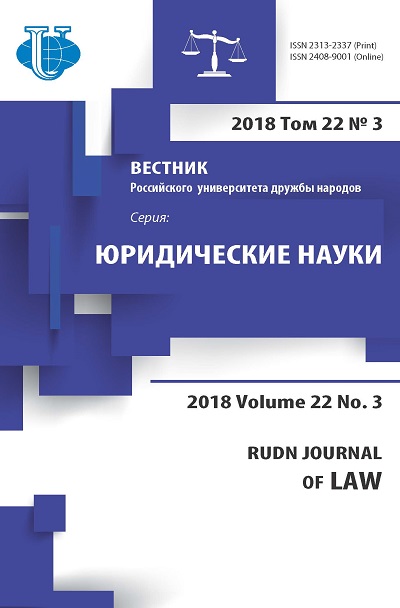Artificial Intelligence in the Legal Space
- Authors: Yastrebov O.A1
-
Affiliations:
- Peoples' Friendship University of Russia
- Issue: Vol 22, No 3 (2018)
- Pages: 315-328
- Section: LAW AND DIGITAL TECHNOLOGIES
- URL: https://journals.rudn.ru/law/article/view/20771
- DOI: https://doi.org/10.22363/2313-2337-2018-22-3-315-328
Cite item
Full Text
Abstract
The active implementation of digital technologies into all spheres of public life, as well as the rapid development of artificial intelligence, is assuming a serious dimension, thus requiring a special attention of the legislator. The article examines the current state of the legal regulation of the artificial intelligence. The author considers the Strategy of the Information Society Development in the Russian Federation for 2017-2030, as well as provides some clear examples of active implementation of artificial intelligence into social reality. The author also provides the McKinsey consulting group's research findings which reflect the prospects for replacing human labor by robots. It is pointed out that the issue of total computerization and the corresponding displacement of a human from the sphere of intellectual activity is rather controversial. The article also discusses the main possible problems related to the artificial intelligence technologies: the problems of responsibility that may arise in the operation of industrial robots; the continuity of digital activity can affect the psychoemotional state. The issue of a possibility for creating robots with intelligence and endowed with personality is being considered from the Philosophy perspective. The conclusion is drawn that the theoretical study of the intellect and the "electronic person" is one of the possible redirections of the Russian law development in modern conditions.
About the authors
Oleg A Yastrebov
Peoples' Friendship University of Russia
Author for correspondence.
Email: yastrebov_oa@rudn.university
Head of Law Institute, RUDN University, Chief Editor of the RUDN Journal of Law, Doctor of Legal Sciences, Professor, Head of the Department of Administrative and Financial Law
Miklukho-Maklaya st., 6, Moscow, Russia, 117198References
- Babayev, A.M. and Shemyakina, M.A. (2016). Otvetstvennost' uchenykh za sozdaniye iskusstvennogo intellekta [The responsibility of scientists for the creation of artificial intelligence]. Nauchno-metodicheskiy elektronnyy zhurnal «Kontsept» [on-line]. (11), pp. 1071–1075. Available at www.e-koncept.ru /2016/86231.htm [Accessed 30 November 2017]. (in Russian).
- Breazeal, C. (2003). Emotion and sociable humanoid robots. International Journal Human-Computer Studies. (59). pp. 119–155.
- Brumshteyn, YU., Il'menskiy, M. and Kolesnikov, I. (2016). Robototekhnicheskiye sistemy: voprosy ispol’zovaniya IS. [Robotic systems: issues of use] Avtorskoye pravo i smezhnyye prava, (9), pp. 49–64 (in Russian).
- Calo, R. (2015). Robotics and the Lessons of Cyberlaw. California Law Review. (103). pp. 513–565.
- Cherkasov, S. (2017). Kogda robotizatsiya lishit nas raboty? [When will robots rob us of our work?] Upravleniye personalom, 8 (420), pp. 5–11. (in Russian).
- Colford, P.A. (2014). Leap forward in quarterly earnings stories. The Definitive Source. Available at www. blog.ap.org / announcements/a-leap-forward-in-quarterly-earnings-stories [Accessed 5 June 2017].
- Kartskhiya, A. (2017). Iskusstvennyy intellekt: «larets Pandory» ili novaya nadezhda? Artificial Intelligence: Pandora's Box or New Hope? IS. Avtorskoye pravo i smezhnyye prava, (4). pp. 23–32. (in Russian).
- Kerimov, D.A. (2001). Metodologiya prava. Predmet, funktsii, problemy filosofii prava. Methodology of law. Subject, functions, problems of the philosophy of law. Moscow: Avanta+ Publ. (in Russian).
- Kotlyarova, V.V. (2015). Sovremennoye nauchnoye poznaniye: paradigma integratsii // Istoricheskiye, filosofskiye, politicheskiye i yuridicheskiye nauki, kul'turologiya i iskusstvovedeniye. Voprosy teorii i praktiki. 91(59). pp. 99–102 (in Russian).
- Kuper, J.R. (2016). The Seventh Sense: Power, Fortune, and Survival in the Age of Networks. Albuquerque: Little, Brown and Company. (in Russian).
- Minayev, B.K. (1987). Problemy predstavleniya znaniy v komp'yuternykh sistemakh. [The problems of knowledge representation in computer systems] Voprosy filosofii. (1). pp. 52–53. (in Russian).
- Morgunovskaya, A. Iskusstvennyy intellekt dlya vsekh. [Artificial Intelligence for All]. 23 April 2017. Available at www. cbsmedia.ru / rossiya/iskusstvennyj-intellekt-dlya-vsex.
- Rakitov, A. I. and Andrianova, T. V. (1986). Filosofiya komp'yuternoy revolyutsii. Voprosy filosofii. (11), pp. 72–81. (in Russian).
- Sokolova, S.N. (2016). Artificial intelligence and safety of society. Bulletin of Palesky State University. Series in Social Sciences and Humanities (1), 2016, pp. 63–68. (in Russian).
- The Guardian. Google's Self-Driving Cars Have Never Gotten a Ticket, 13 November 2015, p. 12.
- Turkle, Sh. (1984). The Second Self. Computers and the Human Spirit. N. Y.; MIT Press.
- Yastrebov, O.A. (2017). Diskussiya o predposylkakh dlya prisvoyeniya robotam pravovogo statusa «elektronnykh lits». Pravovedeniye. [Discussion on the prerequisites for assigning robots legal status of «electronic persons»]. Issues of Jurisprudence (3), 189–203 (in Russian).
- Zuyev, K.A. (1987). Sotsiologicheskiye i sotsial'no-psikhologicheskiye problemy «komp'yu-ternyye revolyutsii». [Sociological and socio-psychological problems "computer revolutions»] Voprosy filosofii. (5). (in Russian).
















